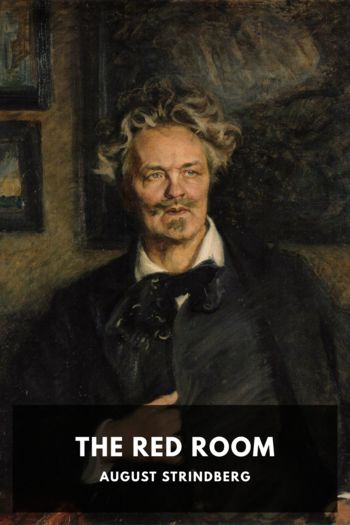The Red Room August Strindberg (best english novels to read txt) 📖

- Author: August Strindberg
Book online «The Red Room August Strindberg (best english novels to read txt) 📖». Author August Strindberg
“ ‘When I saw one-half of humanity engaged in fostering their spiritual growth, while the other half had merely time to attend to their bodily needs, I thought at first that there existed two laws for two different species of man. But my intellect denied this. My spirit rebelled and I resolved that I, too, would escape the curse of the fall—I became an artist.
“ ‘I can analyse the much-talked-of artistic instinct because I was endowed with it myself. It rests on a broad base of longing for freedom, freedom from profitable labour; for this reason a German philosopher defined Beauty as the Unprofitable; as soon as a work of art is of practical use, betrays a purpose or a tendency its beauty vanishes. Furthermore the instinct rests on pride; man wants to play God in art, not that he wants to create anything new—he can’t do that—but because he wants to improve, to arrange, to recreate. He does not begin by admiring his model, Nature, but by criticizing it. Everything is full of faults and he longs to correct them.
“ ‘This pride, spurring a man on to never-ceasing effort, and the freedom from work—the curse of the fall—beget in the artist the illusion that he is standing above his fellow creatures; to a certain extent this is true, but unless he were constantly recalling this fact he would find himself out, that is to say find the unreal in his activity and the unjustifiable in his escape from the profitable. This constant need of appreciation of his unprofitable work makes him vain, restless, and often deeply unhappy; as soon as he comes to a clear understanding of himself he becomes unproductive and goes under, for only the religious mind can return to slavery after having once tasted freedom.
“ ‘To differentiate between genius and talent, to look upon genius as a separate quality, is nonsense, and argues a faith in special manifestation. The great artist is endowed with a certain amount of ability to acquire some kind of technical skill. Without practice his ability dies. Somebody has said: genius is the infinite capacity for taking pains. This is, like so many other things, a half-truth. If culture be added—a rare thing because knowledge makes all things clear, and the cultured man therefore rarely becomes an artist—and a sound intellect, the result is genius, the natural product of a combination of favourable circumstances.
“ ‘I soon lost faith in the sublime character of my hobby—heaven forbid that I should call it my profession—for my art was incapable of expressing a single idea; at the most it could represent the body in a position expressing an emotion accompanying a thought—or, in other words, express a thought at third hand. It is like signalling, meaningless to all who cannot read the signals. I only see a red flag, but the soldier sees the word of command: Advance! After all, even Plato, who was a fine intellectualist and an idealist into the bargain, realized the futility of art, calling it but the semblance of a semblance (-reality); wherefore he excluded the artist from his ideal state. He was in earnest!
“ ‘I tried to find my way back into slavery, but I could not. I tried to find in it my most sacred duty; I tried to resign myself, but I did not succeed. My soul was taking harm, and I was on the way to becoming a beast; there were times when I fancied that all this toil was a positive sin, in as far as it checked the greater aim of spiritual development; at such times I played truant for a day, and fled to nature, absorbed in unspeakably blissful meditations. But then again this bliss appeared to me in the light of a selfish pleasure as great, greater even, than the pleasure I used to feel in my artistic work; conscience, the sense of duty, overtook me like a fury and drove me back to my yoke, which then seemed beautiful—for a day.
“ ‘To escape from this unbearable state of mind, and win light and peace, I go to face the Unknown. You who behold my dead body, say—do I look unhappy in death?
“ ‘Notes made while Walking:
“ ‘The plan of the world is the deliverance of the idea from the form; art, on the other hand, attempts to imprison the idea in a sensuous form, so as to make it visible. Therefore. …
“ ‘Everything corrects itself. When artistic traffic in Florence surpassed all bounds Savonarola came—the profound thinker! and spoke his “All this is futile.” And the artists—and what artists they were! made a pyre of their masterpieces—Oh! Savonarola!
“ ‘What was the object of the iconoclasts in Constantinople? What did the baptists and breakers of images want in the Netherlands? I dare not state it for fear of being branded.
“ ‘The great striving of our time: division of labour benefits the species but sentences the individual to death. What is the species? The conception of the whole; the philosophers call it the idea and the individuals believe what they say and lay down their lives for the idea!
“ ‘It is a strange thing that the will of the princes and the will





Comments (0)